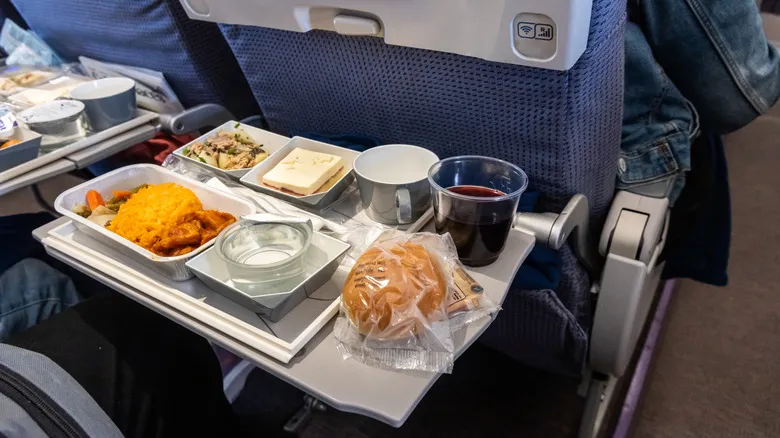Skip the meat and seafood
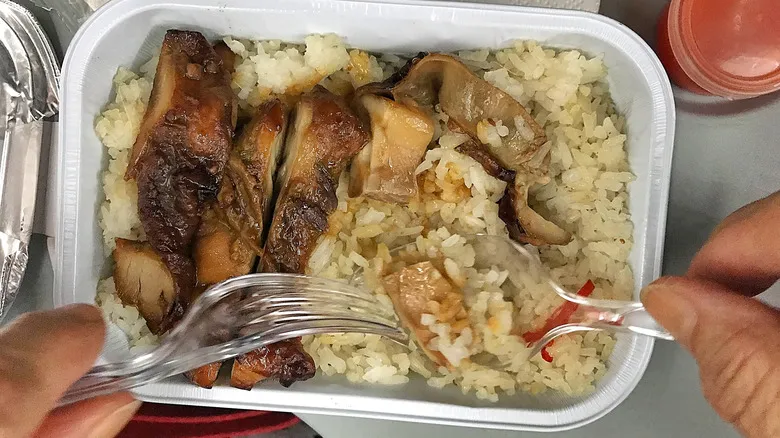
Steering clear of meat and seafood significantly reduces the variety of meals available to you on an airplane, as many airlines serve dishes like shrimp scampi, beef stroganoff, and grilled chicken, among others. The primary concern with these food categories is temperature control. Airplane meals are prepared on the ground and then transported to the aircraft, making it challenging to maintain proper temperatures throughout the process. Both meat and seafood must be stored and reheated at specific temperatures to prevent the growth of harmful bacteria.
If not handled properly, bacteria can multiply and lead to illness. Undercooked meat and seafood can harbor E. coli, and this risk extends to deli meats as well. Ready-to-eat items like turkey and ham slices are often not reheated to high temperatures before serving, so if they haven't been stored correctly, E. coli contamination is a possibility. Exercise caution with that ham and cheese sandwich that may seem harmless.
Be wary of dairy and eggs
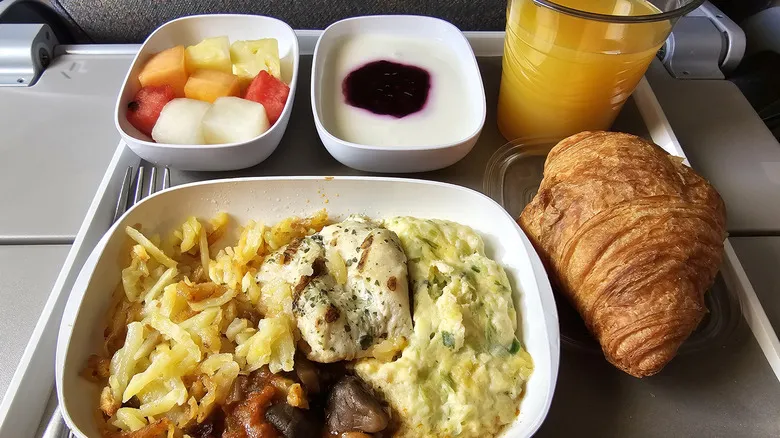
Most airlines typically provide a choice between a meat-based meal and a vegetarian option during in-flight service. This doesn't necessitate a special request, as there is usually a dish like pasta or a scrambled egg breakfast sandwich available. Consequently, avoiding dairy and eggs can be challenging while flying, but there are some guidelines to consider.
Undercooked eggs can pose a risk of E. coli, so it's important to inspect any egg dish you receive, whether it's scrambled, hard-boiled, or in an omelet form, to ensure it has been properly cooked. If any part of the dish looks runny, it's advisable to steer clear of it.
Regarding dairy, products such as yogurt, milk, and soft cheeses can spoil quickly if not kept chilled. For instance, bacteria can start to develop in milk and yogurt after just 2 hours at room temperature. While E. coli is a concern, other harmful bacteria like listeria and salmonella can also proliferate. If the yogurt or cheese feels warm when it should be cold, it's best not to take the risk.
Take a rain check on raw vegetables and pre-cut fruits
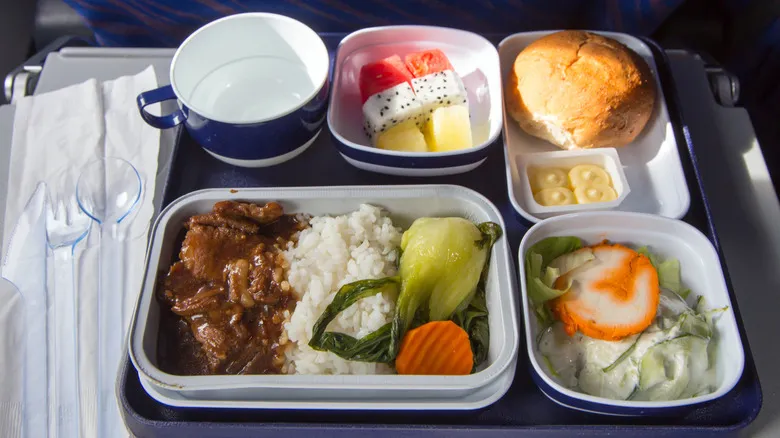
A crisp salad or a bowl of fresh fruit can feel like a revitalizing and hydrating choice after spending hours in recycled air. However, raw vegetables and pre-sliced fruit are vulnerable to common foodborne bacteria such as E. coli, Salmonella, and Listeria. These pathogens can be present in the soil where the produce is cultivated and may linger on the surfaces of lettuce, vegetables, and fruit. If not properly washed, chopped, and stored, they can pose a risk of food poisoning and other health issues.
This concern extends beyond just airlines; these foods contribute significantly to foodborne illness cases in the United States. With items like salads, raw vegetable mixes, or fruit slices, it can be nearly impossible to determine their safety. Ultimately, it comes down to your personal comfort level with risk management. Cooked vegetables served piping hot are generally a safer option than raw ones. Whole, unpeeled fruits—such as bananas, apples, and oranges—are preferable to pre-cut fruit salads.
What food can you eat on airplanes?
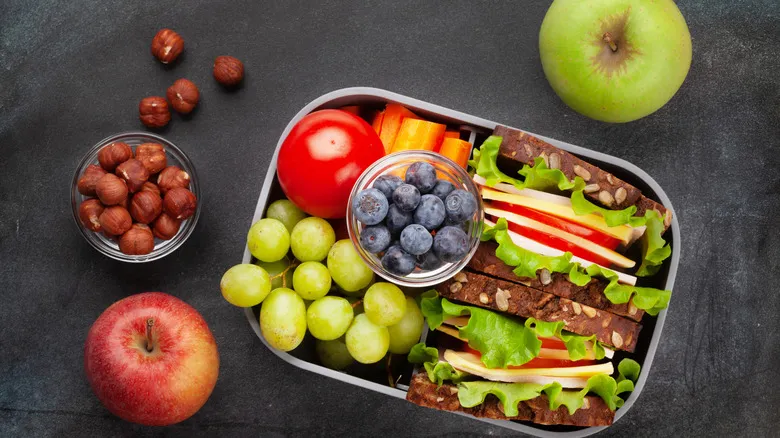
Generally, it's advisable to opt for hot vegetarian or vegan meals. Airlines typically offer these options for those with dietary restrictions, which can be arranged online or via phone. By choosing this route, you can avoid potentially contaminated meat and seafood, and for vegetarian meals, just be cautious of any questionable dairy, eggs, or raw ingredients.
The packaged snacks provided by airlines are generally safe to consume, as are bread products. Whole, unpeeled fruits and cooked vegetables are also good options. Canned and bottled beverages are perfectly acceptable, though opinions vary regarding airplane coffee, ice, and hot water, as the cleanliness of water tanks and ice storage can be inconsistent. Alcohol is fine to drink, but it may contribute to dehydration, and it's best to skip the pricey wine, as it often isn't worth it. For meals, hot options like stews, soups, curries, and cooked vegetables are your safest choices.
Ultimately, trust your instincts. If a food item appears or tastes off, it likely is. The most reliable way to eat on a plane is to bring your own food. You’ll know exactly how it was prepared and stored, eliminating any uncertainty. Just be sure to check TSA regulations regarding liquids, but there are many foods and snacks that can easily pass through security.
Recommended

Can You Freeze Cheese Curds?

Why You May Want To Wash Farm Fresh Eggs
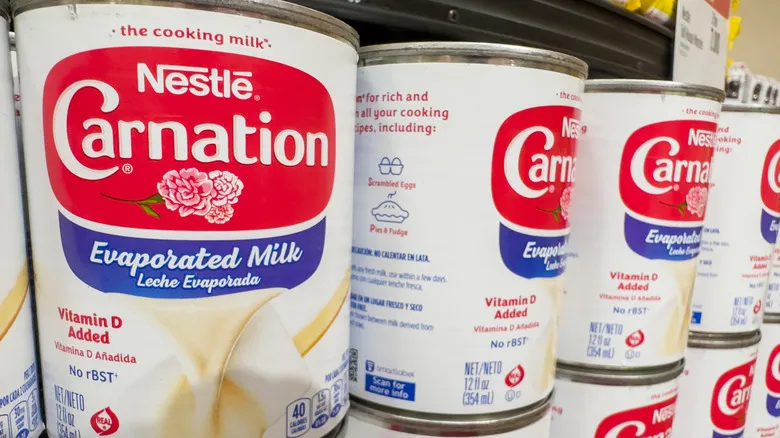
How Long Does Evaporated Milk Last After Opening?

What's The Best Way To Store Leftover Cake?
Next up

